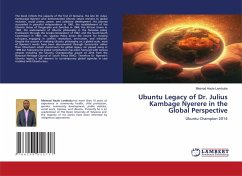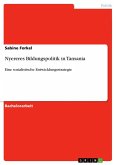The book reflects the capacity of the first of Tanzania, the late Dr. Julius Kambarage Nyerere who demonstrated Ubuntu values relevant to global inclusion, social justice, peace, and collective development. His journey succeeded in peaceful independence in 1961, the establishment of the Ubuntu Union of Tanganyika and Zanzibar in 1964, the African Union in 1963, the endorsement of Ubuntu philosophy in the Tanzania policy framework through the Arusha Declaration of 1967, and the South-South Commission in 1987, etc. Ujamaa Policy broke the record for hosting refugees, engaging in conflict resolutions, anti-racism, and tribalism. Despite the success of realizing Ubuntu philosophy on a global scale, most of Nyerere's works have been documented through Eurocentric rather than Ubuntuism which disconnects his global legacy. He passed away in 1999 but following his global contributions has been honored with various awards including the Ubuntu Championship award of 2014 from the National Heritage Council of South Africa (NHC). Therefore Dr. Nyerere's Ubuntu legacy is still relevant to contemporary global agendas in case revisited with Ubuntu lens.
Bitte wählen Sie Ihr Anliegen aus.
Rechnungen
Retourenschein anfordern
Bestellstatus
Storno








